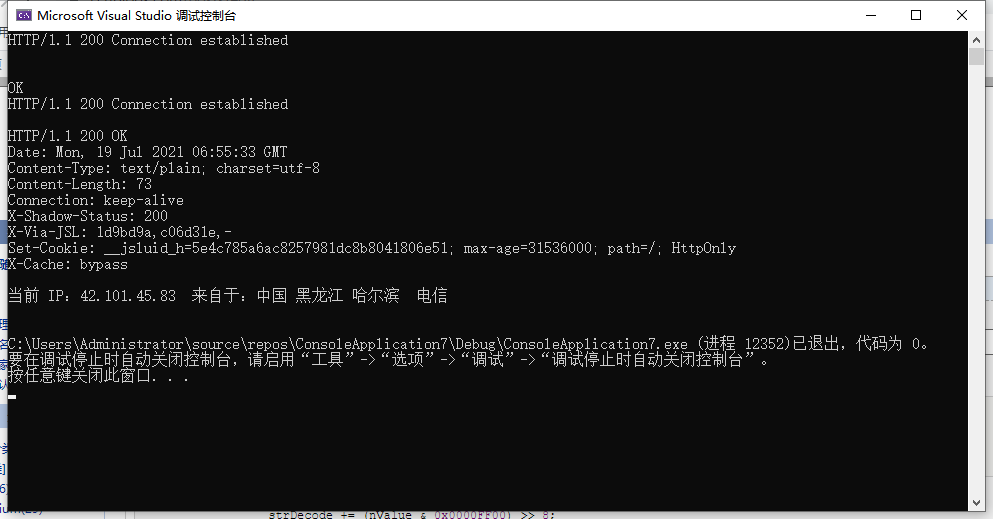一开始使用winhttp....但是!实在是找不到资料 也不知道要怎么设置,感觉哪个文档都有点看不懂
最后采用socket设置代理
网上搜了一圈各种都有 就是不能用!
最后看到两个不错的博主
决定参考着自己写 !
要使用的时候记得改下代理IP端口账密~
参考了这两个作者的:
https://blog.csdn.net/bodybo/article/details/7274865
https://blog.csdn.net/yu1121jm/article/details/85132224
我的代码记得改下账密哦 我等下再改个完善版本的出来
#include <cstdio> #include <string> #include <iostream> #include <algorithm> #include <Winsock2.h> #include <Ws2tcpip.h> #pragma comment(lib, "Ws2_32.lib") using namespace std; #define USE_PROXY 1 //是否使用代理 #define PROXY_ADDR "42.101.45.83" //代理IP #define PROXY_PORT 22807 //代理端口 //把username:password 转成 Base64 比如 D5565507:568FD2320185转化成RDU1NjU1MDc6NTY4RkQyMzIwMTg1 string Encode(const unsigned char* Data, int DataByte) { //编码表 const char EncodeTable[] = "ABCDEFGHIJKLMNOPQRSTUVWXYZabcdefghijklmnopqrstuvwxyz0123456789+/"; //返回值 string strEncode; unsigned char Tmp[4] = { 0 }; int LineLength = 0; for (int i = 0; i < (int)(DataByte / 3); i++) { Tmp[1] = *Data++; Tmp[2] = *Data++; Tmp[3] = *Data++; strEncode += EncodeTable[Tmp[1] >> 2]; strEncode += EncodeTable[((Tmp[1] << 4) | (Tmp[2] >> 4)) & 0x3F]; strEncode += EncodeTable[((Tmp[2] << 2) | (Tmp[3] >> 6)) & 0x3F]; strEncode += EncodeTable[Tmp[3] & 0x3F]; if (LineLength += 4, LineLength == 76) { strEncode += " "; LineLength = 0; } } //对剩余数据进行编码 int Mod = DataByte % 3; if (Mod == 1) { Tmp[1] = *Data++; strEncode += EncodeTable[(Tmp[1] & 0xFC) >> 2]; strEncode += EncodeTable[((Tmp[1] & 0x03) << 4)]; strEncode += "=="; } else if (Mod == 2) { Tmp[1] = *Data++; Tmp[2] = *Data++; strEncode += EncodeTable[(Tmp[1] & 0xFC) >> 2]; strEncode += EncodeTable[((Tmp[1] & 0x03) << 4) | ((Tmp[2] & 0xF0) >> 4)]; strEncode += EncodeTable[((Tmp[2] & 0x0F) << 2)]; strEncode += "="; } return strEncode; } //把 Base64 转成 username:password 比如 RDU1NjU1MDc6NTY4RkQyMzIwMTg1转化成D5565507:568FD2320185 string Decode(const char* Data, int DataByte, int& OutByte) { //解码表 const char DecodeTable[] = { 0, 0, 0, 0, 0, 0, 0, 0, 0, 0, 0, 0, 0, 0, 0, 0, 0, 0, 0, 0, 0, 0, 0, 0, 0, 0, 0, 0, 0, 0, 0, 0, 0, 0, 0, 0, 0, 0, 0, 0, 0, 0, 0, 62, // '+' 0, 0, 0, 63, // '/' 52, 53, 54, 55, 56, 57, 58, 59, 60, 61, // '0'-'9' 0, 0, 0, 0, 0, 0, 0, 0, 1, 2, 3, 4, 5, 6, 7, 8, 9, 10, 11, 12, 13, 14, 15, 16, 17, 18, 19, 20, 21, 22, 23, 24, 25, // 'A'-'Z' 0, 0, 0, 0, 0, 0, 26, 27, 28, 29, 30, 31, 32, 33, 34, 35, 36, 37, 38, 39, 40, 41, 42, 43, 44, 45, 46, 47, 48, 49, 50, 51, // 'a'-'z' }; //返回值 string strDecode; int nValue; int i = 0; while (i < DataByte) { if (*Data != ' ' && *Data != ' ') { nValue = DecodeTable[*Data++] << 18; nValue += DecodeTable[*Data++] << 12; strDecode += (nValue & 0x00FF0000) >> 16; OutByte++; if (*Data != '=') { nValue += DecodeTable[*Data++] << 6; strDecode += (nValue & 0x0000FF00) >> 8; OutByte++; if (*Data != '=') { nValue += DecodeTable[*Data++]; strDecode += nValue & 0x000000FF; OutByte++; } } i += 4; } else// 回车换行,跳过 { Data++; i++; } } return strDecode; } #if USE_PROXY SOCKET _connect(const char* addr, unsigned short port) #else SOCKET _connect(struct in_addr* addr, unsigned short port) #endif { SOCKET sockfd = INVALID_SOCKET; struct sockaddr_in sin = { 0 }; int ret = 0; sockfd = socket(AF_INET, SOCK_STREAM, IPPROTO_TCP); if (INVALID_SOCKET == sockfd) { printf("socket failed. "); return sockfd; } sin.sin_family = AF_INET; sin.sin_port = htons(port); #if USE_PROXY //sin.sin_addr.s_addr = inet_addr(addr); inet_pton(AF_INET, addr, &sin.sin_addr); #else sin.sin_addr = *addr; #endif ret = connect(sockfd, (struct sockaddr*)&sin, sizeof(struct sockaddr_in)); if (0 != ret) { printf("socket failed. "); closesocket(sockfd); sockfd = INVALID_SOCKET; } return sockfd; } void _close(SOCKET sockfd) { if (INVALID_SOCKET != sockfd) { closesocket(sockfd); } } int Receive(SOCKET socket, char* buf, int bufLen) { return recv(socket, buf, bufLen, 0); } bool Send(SOCKET socket, const char* buf, int len) { long ilen = len; int sendCnt = 0; int ret; while (sendCnt < ilen) { if ((ret = send(socket, buf + sendCnt, ilen - sendCnt, 0)) == SOCKET_ERROR) { return false; } else { sendCnt += ret; } } return true; } void connect_proxy(SOCKET sockfd) { // proxy user and password: dXNlcm5hbWU6cGFzc3dvcmQ= is "username:password" with base64 encode //const char* header = "CONNECT myip.ipip.net:80 HTTP/1.1 Authorization: Basic RDU1NjU1MDc6NTY4RkQyMzIwMTg1 Proxy-Authorization: Basic RDU1NjU1MDc6NTY4RkQyMzIwMTg1 "; const unsigned char a[] = { "D5565507:568FD2320185" }; string b = Encode(a, 21); char header[2048]; sprintf_s(header, sizeof(header), "CONNECT myip.ipip.net:80 HTTP/1.1 Authorization: Basic %s Proxy-Authorization: Basic %s ", b.c_str(), b.c_str()); int offset = 0; char buf[2048] = { 0 }; Send(sockfd, header, strlen(header)); Receive(sockfd, buf, sizeof(buf)); cout << buf << endl; if (strstr(buf, "HTTP/1.1 200 Connection established") != NULL) { printf("OK "); printf("%s",buf); } } void http_request() { SOCKET sockfd = INVALID_SOCKET; struct hostent* host = NULL; const char* header = "GET / HTTP/1.1 Host: myip.ipip.net "; //我们要请求的网址的域名 char buf[2048] = { 0 }; #if USE_PROXY sockfd = _connect(PROXY_ADDR, PROXY_PORT); connect_proxy(sockfd); #else host = gethostbyname("myip.ipip.net"); sockfd = _connect((struct in_addr*)host->h_addr_list[0], 80); #endif Send(sockfd, header, strlen(header)); Receive(sockfd, buf, sizeof(buf)); _close(sockfd); string info(buf); //编码转换 防止在控制台显示乱码 char* pszBuffer = new char[info.length() + 1]; wchar_t* pszWideBuffer = new wchar_t[(info.length() + 1) * 2]; memset(pszWideBuffer, 0, (info.length() + 1) * 2); memset(pszBuffer, 0, info.length() + 1); MultiByteToWideChar(CP_UTF8, 0, info.c_str(), info.length(), pszWideBuffer, (info.length() + 1) * 2);//将unicode编码,转换为宽字节 WideCharToMultiByte(CP_ACP, 0, pszWideBuffer, wcslen(pszWideBuffer), pszBuffer, info.length() + 1, NULL, NULL);//将宽字节,转换为控制台编码 //cout << pszBuffer; info = pszBuffer; delete[] pszBuffer; delete[] pszWideBuffer; cout << info << endl; } int main() { WSADATA wsaData; ///这个结构被用来存储 被WSAStartup函数调用后返回的 Windows Sockets数据 WSAStartup(MAKEWORD(2, 2), &wsaData);//初始化网络编程能够使用的函数或方法等....初始化后,就可以创建套接字了 搜索对应的Socket库 这是使用2.2的版本 http_request(); //请求数据 WSACleanup();//终止Winsock 2 DLL (Ws2_32.dll) 的使用 return 0; }
